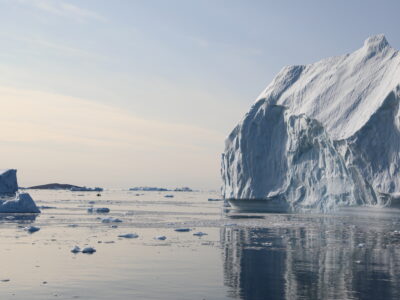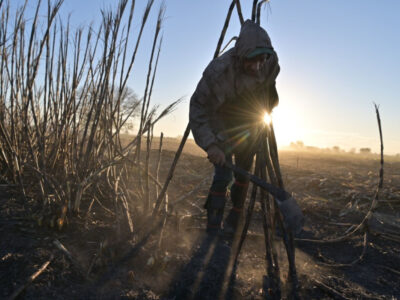
Catherine McKenna, Canada’s former Minister of Environment and Climate Change and a senior research scholar at Columbia’s Climate School, never imagined becoming a politician.
“What did I want to do when I grew up? I didn’t care about politics,” said McKenna, at a recent event at the Climate School. “I wanted to go to the Olympics [as a swimmer]. When I was 13 years old, that’s all I dreamed about.”

You cannot plan your life out, she told the room. It’s only in retrospect that you can connect the dots and create a nice story for your CV. (And it’s safe to say McKenna’s CV is quite an impressive one.)
But first, McKenna recounted the different directions her professional path took—from working at a pub in London and teaching swimming lessons (to former U.K. Prime Minister Tony Blair’s child) while studying for her master’s degree in international relations at the London School of Economics, to working for a G7 research group. McKenna then went to law school to pursue international law and human rights, and worked as a lawyer in Indonesia before becoming a senior negotiator with a U.N. peacekeeping mission in East Timor.
When she returned to Canada, McKenna co-founded a charitable organization called Canadian Lawyers Abroad, hoping to continue international humanitarian efforts. But she recalled being encouraged by one of her mentors to work on issues closer to home, including injustices faced by Canada’s Indigenous populations, rather than focusing on inequitable conditions abroad. Canadian Lawyers Abroad has since evolved into Level Justice, an organization that helps all communities in Canada play an active part in the legal system.
Despite her best efforts to effect positive change in Canada, McKenna found herself becoming disillusioned with the government in power in 2015. “The government was very against reconciliation with Indigenous peoples and it didn’t care about climate. These were things were really important to me. So that’s why I stepped up into politics,” she said, as she urged the young people in the room to consider this possibility as well.
“We need good people, wherever you may live, to consider going into politics. It’s not easy, but it’s extremely important,” McKenna said.
“I did not know that I would one day be Minister of Environment and Climate Change. That was not the plan. Everyone is going to have a different journey, and I want you to feel like you can do it too—whatever it is that you want to do.”
She also entered politics as a promise to work toward a better world for the children—her own three kids as well as all the children who would grow up and inherit the many complex issues of their predecessors.
So in 2015, McKenna and her team knocked on over 100,000 doors while campaigning for a seat in Parliament, she said, showing the room a picture of just one of the many pairs of running shoes that were destroyed along the way.

From the beginning of her campaign, McKenna vowed to center people and communities in her communication and platforms. “I come from Hamilton, which is a steel town a little bit like Detroit, where you’ve got to be a real person and you can’t talk like an alien, which is actually what climate people often do,” McKenna told attendees.
All the hard work paid off. Just days after being elected, Prime Minister Justin Trudeau called to ask McKenna if she would be Canada’s first Minister of the Environment and Climate Change and join COP21 in Paris a few days later (shortly after she learned that COP stood for “Conference of the Parties”).
“I did not know that I would one day be Minister of Environment and Climate Change. That was not the plan. It was amazing, but everyone is going to have a different journey, and I want you to feel like you can do it too—whatever it is that you want to do.” McKenna said.
COP21 became a historic conference—the first time the countries of the world agreed to tackle climate change with an ambitious goal of limiting global temperature rise below 2 degrees Celsius, and ideally 1.5 degrees—and an achievement McKenna noted was possible due in large part to the many extraordinary women at the negotiating table.
McKenna learned countless lessons at COP21—including how one wrong word (“should” versus “shall”) could sink an agreement in its final moments, or how a seemingly small player (geographically speaking) like the Marshall Islands could create a tremendous difference on the world stage by founding the High Ambition Coalition—a group that successfully pushed for a 1.5 degree temperature target. And McKenna returned to Canada more determined than ever that climate change was the critical issue to address—and that their government would need multilateral support to do so.
McKenna made “pinky promises” to the many young people she met along her journey that she would work toward a safer world for them. “I’ve left politics, but I still have those kids as a reminder of what this is all about. We have the solutions, we can scale the solutions, but we are constantly finding reasons why we can’t do things,” McKenna said.
Earlier this year, McKenna—who is also CEO of Climate and Nature Solutions and founder of Women Leading on Climate—and Laurence Tubiana, CEO of the European Climate Foundation and France’s climate change ambassador and special representative for COP21, authored an article in Time magazine about why this year must be the one for exponential climate action, distilling necessary actions into five key items:
1. Implement the International Energy Agency net zero pathway
2. Phase out fossil fuels
3. Scale financing to the Global South
4. Align national and subnational net zero action
5. Empower people.
“Governments will break your heart sometimes,” McKenna told the Climate School attendees. “But people are real, and people believe and want action.”
Speaking directly to the audience, McKenna said, “This isn’t over. I’m still trying, but now it’s on you [to fight climate change and help build a better future]. That’s the quid-pro-quo pinky promise to me.”




Catherine was on CBC and said we have the solutions to get rid of the carbon fuels. What is this solution she is suggesting?